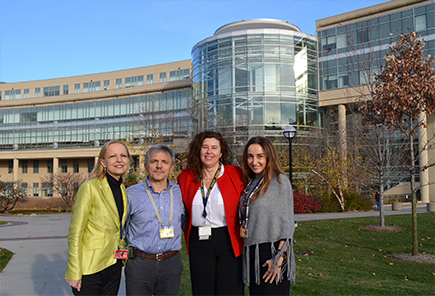The University of Michigan Medical School has in recent years become a popular learning destination for Macedonian students and scholars, while groups of U-M faculty members have twice made the journey to the small Balkan nation to share expertise and meet with counterparts at Ss. Cyril and Methodius University, home to Macedonia’s largest medical school.

“I had a vision to create a viable exchange program for students and scholars, but I was thinking on a small-scale partnership, mainly developing a relationship within the rheumatology division, which is my interest,” said UMMS Assistant Professor of Internal Medicine and native Macedonian Vladimir Ognenovski, who helped establish connections with Cyril and Methodius more than a decade ago. “With the help of some of my colleagues, we’ve been able to do much more than that.”
He is part of a small group of UMMS doctors who, with financial support from the Macedonian Ministry of Health, have in the last few years managed to bring some 25 visiting doctors as well as more than a dozen students from Ss. Cyril and Methodius University to U-M for educational rotations. Most recently, Daniela Miladinova, Ss. Cyril and Methodius Associate Professor and Vice Dean for International Collaboration, spent the month of November UMMS, observing and training with the Radiology Department on the latest imaging equipment.
“For me, it is very insightful to see what methodologies have been adopted, what investments have been made, and how the department works with other departments and divisions at UMMS,” said Dr. Miladinova. “Being able to spend time here is to get a glimpse of where nuclear medicine is headed in Macedonia in the next decade.”
Macedonia declared independence from the former Yugoslavia only 25 years ago, and the government has been investing in the small country’s medical infrastructure, including supporting the partnership between UMMS and Ss. Cyril and Methodius by financing many of the exchanges. Macedonian scholars across many disciplines, including cardiac surgery, orthopedics, cardiology, rheumatology, pathology, gynecology and obstetrics, pulmonology and radiology, have spent time at U-M since a Memorandum and Understanding agreement between the two institutions was first signed in 2009.
Groups of UMMS faculty have also visited Macedonia to share and exchange knowledge during symposium meetings there. Most recently, Assistant Professor of Radiology Jadranka Stojanovska, Macedonia native led a group of five UMMS colleagues to Macedonia for a two-day advanced radiology symposium in the fall of 2015. The event covered advanced modalities in breast imaging, cardiothoracic radiology, musculoskeletal radiology, nuclear medicine, and uroradiology.
“One of the things I love about U-M is that everyone is so willing to share their time and knowledge. It’s an enormously collaborative culture here,” said Dr. Stojanovska. “I am extremely grateful to my chair, Dr. N. Reed Dunnick, and my colleagues who wholeheartedly supported me in organizing rotations for Macedonian observers and medical students in the Department of Radiology.”
Dr. Stojanovska has also helped organize rotations for Macedonian colleagues in cardiology and cardiac surgery. Next on the horizon for the partnership is a translational pathology symposium in Macedonia being planned for early 2017 by Associate Professor of Pathology – and Macedonia native – Zaneta Nikolovska-Coleska. She has also been instrumental in the partnership, helping to organize rotations for Macedonia colleagues in a variety of UMMS departments, including pathology, otolaryngology, and obstetrics and gynecology.
“You can’t forget where you come from,” said Nikolovska-Coleska, PhD, who has been at UMMS since 2001. “Everyone at U-M has been so supportive of everything we’re doing. Every time I email a colleague about getting involved and sharing their expertise, they are always so eager to help. It means a lot.”
Down the road, she and others hope to expand the partnership to develop collaborative joint research projects between faculty from both institutions, as well as create regular opportunities for U-M students and scholars to do educational rotations in Macedonia. UMMS learners stand to gain both experience and new perspectives.
“Looking ahead to the future, the bigger benefit will be opportunities for faculty and students here to do rotations in Macedonia,” said Nikolovska-Coleska. “In addition to helping improve education and making an impact at another institution, our medical students will be exposed to an entirely different culture and healthcare system, which helps them become better physicians.”
